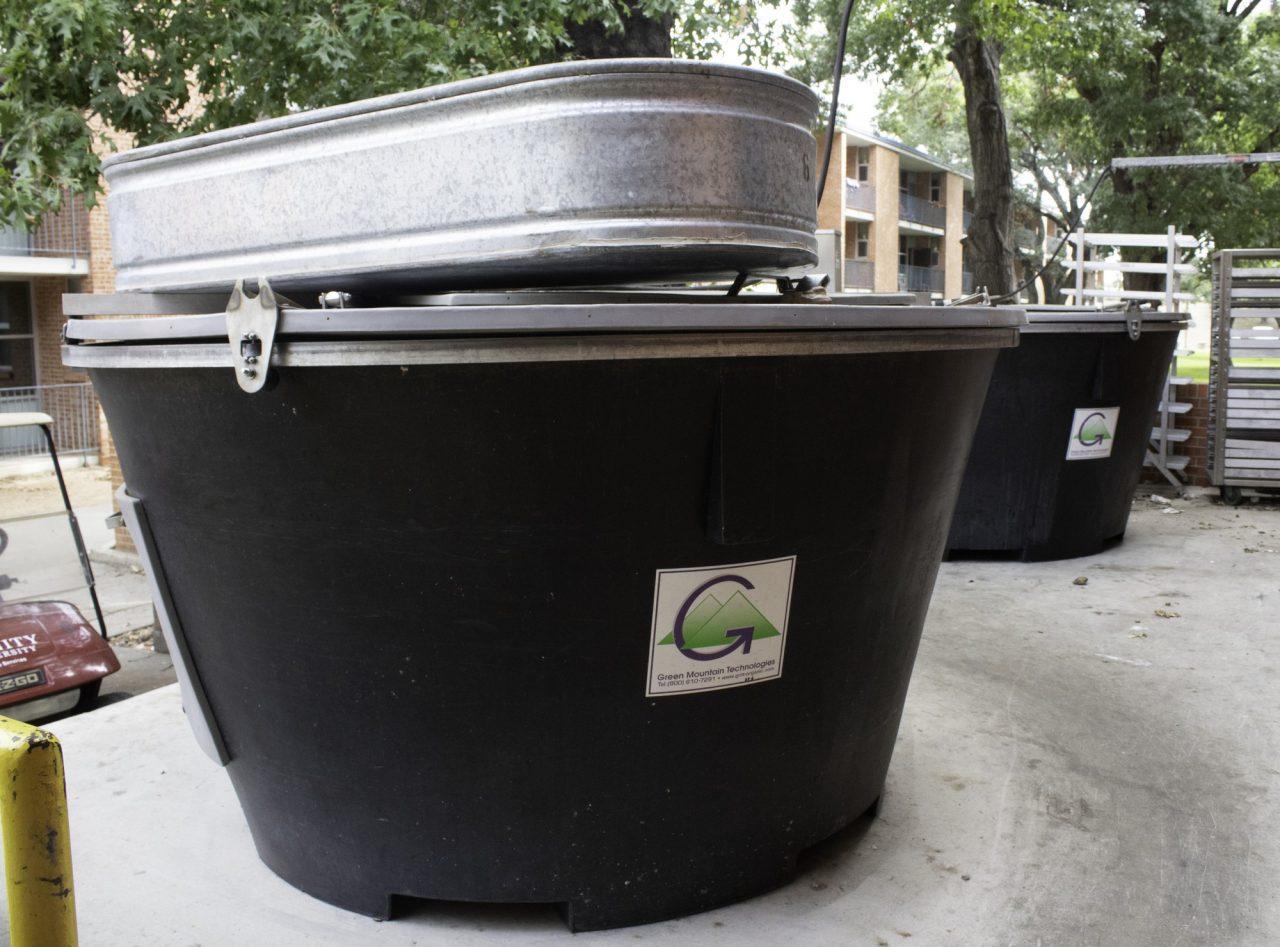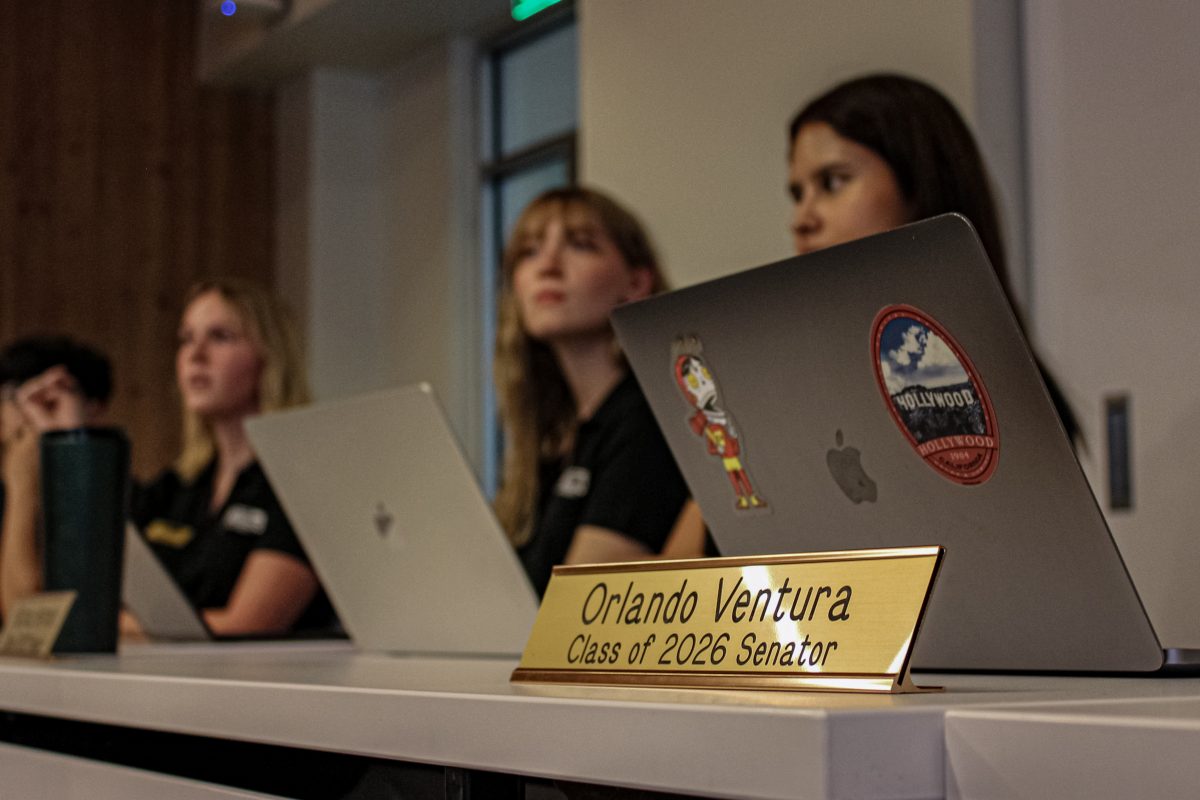Photo by Matthew Claybrook.
A university sustainability committee, composed of faculty, students, administrators and Aramark representatives, is searching for a solution for the current composting system at Mabee Dining Hall. The current system of two Earth Tubs is temporarily inoperative after over a decade of use.
Composting is the process of recycling decomposed organic material into soil fertilizer. The Earth Tubs are a self-contained system used to compost food waste. Two tubs were installed in the dock behind Mabee Dining Hall in 2008 as part of a sustainability initiative, according to Jim Baker, senior director of Facilities Services. Compost produced by the system is used and distributed across campus by Facility Services. The Earth Tub models were used nationally on many other college campuses at the time, according to Baker.
The Earth Tubs are no longer functional because they have degraded over time, and the technology of the tubs has become somewhat outdated. Because of this, the composting system will be removed in the coming week.
“Ten years is a long time for [the Earth Tubs] to sit outside in the sun and churn food waste,” Baker said. “Step one is to remove the [Earth Tubs] from the location then decide what to do with the food waste. We all want to do something, but the [sustainability committee is] looking at other models with newer technology and maybe a secondary location.”
This may mean fixing the components of the Earth Tubs or implementing a newer alternative. The tubs will be temporarily removed within a week’s time to be assessed by Facility Services.
Sharon Curry, sustainability coordinator, credits the composting system with reducing the waste sent to landfills since 2008.
“The program was successful from the start. Prior to the initiative, both targeted recycling and pre-consumer composting, the compactor on site was being serviced six days a week. After the programs were implemented, we were able to reduce the number of service days to three days per week,” Curry wrote in an email interview.
The Earth Tubs were able to process the amount of food coming from Mabee until five years ago when Mabee switched to a buffet-style from single serving-style. At this point, the tubs began to exceed capacity. Trinity Dining Services now throws approximately 92 pounds of food scraps into the Earth Tubs daily.
“When the dining service was converted to an all-you-can-eat format, we quickly began to exceed the capacity of the two units. When we exceeded capacity, we had to either divert waste back into the landfill or remove the compost from an Earth Tub and try to finish the composting process elsewhere on campus to meet demand. Neither of these solutions was ideal,” Curry wrote in an email interview.
The Earth Tubs are designed to compost only pre-consumer products like fruit and vegetable scraps and coffee and tea grounds. Composting the pre-consumer products is a month-long process. Once the food scraps totally breakdown and decompose, the finished compost is distributed by facility services around campus.
Now that the Earth Tubs are wearing out, the sustainability committee is considering other viable options for composting on campus. When looking for other alternatives, the sustainability committee has multiple concerns to address. The funding source is still being determined.
According to Scott Neale, sustainability committee chair and professor in the Department of Human Communication and Theatre, there were a few issues with the tubs even before the system was no longer functioning.
“[The Earth Tubs] are currently [obstructing] access to some of the recycling bins for cardboard, and they are overcapacity,” Neale said. “Although they are not completely blocking facility services from accessing the recycling bins, the Earth Tubs do make it more difficult to reach.”
Although the Earth Tubs have a few kinks, if they are able to be fixed, they will most likely be repaired and continue to be used, according to Neale. If this is not possible, an alternative like sending compostable material off-campus has been proposed. The committee is waiting for the Earth Tubs to be evaluated, which should occur within a week’s time. If it is determined that fixing them is not the best solution, then action to replace them will be taken although it is not clear what may be done.
“We are discussing alternative options, such as sending the excess food scraps to some of the local pig farms because pigs are especially great at sorting out contaminants like plastics which can’t be put in the Earth Tubs,” Neale said.
There is also talk among the sustainability committee to buy a new Earth Tub, but there are limits on both physical space and funding.
The sustainability committee will meet again in the coming weeks to determine a solution moving forward.








